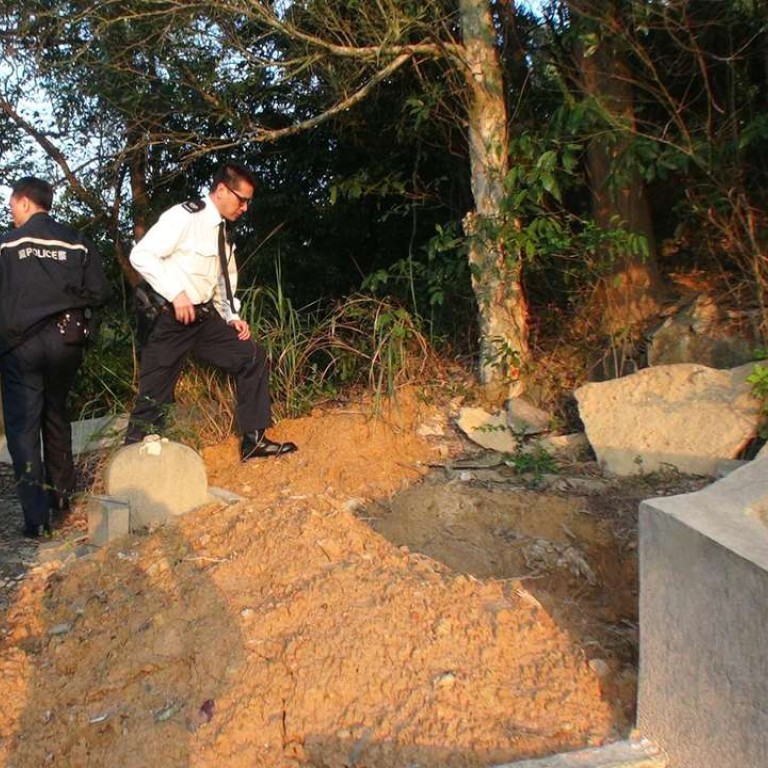
Tomb raiders: Far from the glamour of Lara Croft and Indiana Jones, these are thieves with a history of being difficult to legislate against
Recent cases of grave robbing in Hong Kong remind us that there are few laws to protect the dead
The reality of tomb raiding is not that of the glamorous treasure hunter Lara Croft or the antiquities-saving professor Indiana Jones, but a thief selecting easy and rich targets.
This applies to the recently buried as well as ancient tombs, as we have been reminded in Hong Kong in recent months with the Post carrying stories of graves being dug up, coffins ransacked and left exposed and valuables interred with the dead being stolen.
In October, when the first case made headlines, police classified the case as criminal damage which surprised many, but there are very few laws that protect the dead in Hong Kong.
The city has statutory provisions which make disturbing graves and the exhumation of a corpse a crime; however there is no crime of disturbing the dead. The most serious possible charge remains prosecution for theft, relying on the ancient English case of William Haynes.
In 1613, William Haynes was accused at the Leicester Assizes of digging up four corpses from a graveyard and taking the sheets which had been wound around the corpses. A point of law was referred to the Justices at the Serjeant’s Inn, London, because any case of theft had to involve taking property that belonged to someone.
The issue – did the winding sheets belong to anyone?
The Justices soon clarified that “a dead body, being but a lump of earth hath no capacity”, could not receive gifts or own property. This could have resulted in the interpretation that the sheets belonged to no one but the common law detests a vacuum and a gap in ownership will usually be filled by construing the would-be donor to still be the owner.
Therefore, if a gift could not be made to the dead, the sheets belonged to those who had given them. Haynes was found guilty of petty larceny for the first theft and whipped, but because he could recite verses from the Bible, he had his “clergy” and thus escaped the felony charges associated with the other three thefts.
Haynes’ case illustrated the problems associated with any interference with the dead and a later interpretation of the case, by the noted English jurist Edward Coke, led to a further complications.
Coke interpreted Haynes’ case as giving rise to the principle that dead bodies could not be property – the “no-property” principle – as the cadaver was caro data vermibus (“flesh given to worms”) and nullius in bonis (to the good of no one).
This caused problems in 18th century Britain as medical science progressed and demand outstripped supply for corpses for dissection.
Simple market demand resulted in grave robbing for the corpse and notorious cases of “arrest” of the dead – where the corpse would be seized by those claiming the deceased owed them money or where workhouse managers would refuse to release corpses of the poor until some manufactured debt had been paid by the relatives or friends and threatening to sell the body to doctors to meet the debt.
It even resulted in the case of Burke and Hare in Edinburgh, who contrary to popular belief were not grave robbers but merely murderers.
To combat the practice of grave-robbing for the corpse itself the common law invented the crime of removing a corpse from a burial ground, which was eventually replaced by statutory provision making exhumation of a corpse without a licence a crime.
Tomb and grave robbing have existed since we began burying our dead with valuables; the ancient Egyptian tombs were robbed within a few years of their interment and there are reports that the tomb of the First Emperor was looted soon after his death.
Unfortunately tombs and graves remain easy targets for thieves as they are often sited in lonely, inaccessible places or in places that are not regularly visited.
Steven Gallagher is Associate Dean (Teaching and Learning) at the Faculty of Law, The Chinese University of Hong Kong.
